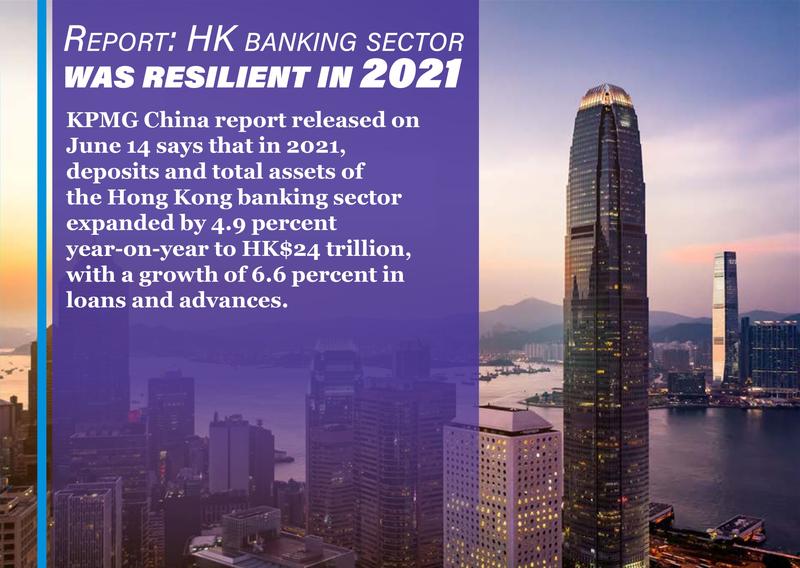 This general view shows the HSBC headquarters (center, right) building and the Standard Chartered Bank building (center, left) in Hong Kong on Jan 31, 2020. (ANTHONY WALLACE / AFP)
This general view shows the HSBC headquarters (center, right) building and the Standard Chartered Bank building (center, left) in Hong Kong on Jan 31, 2020. (ANTHONY WALLACE / AFP)
HONG KONG – The Hong Kong banking sector showed resilience last year as the global economy recovered from the recession, according to a KPMG China report released on Tuesday.
In 2021, deposits and total assets of the Hong Kong banking sector expanded by 4.9 percent year-on-year to HK$24 trillion, with a growth of 6.6 percent in loans and advances, the report said.

Paul McSheaffrey, partner of financial services at KPMG China, expects revenue growth in the banking sector for the rest of this year, and likely in 2023, with “inflation and interest rate increases expected through this year.”
The US Federal Reserve announced an increase in the Federal Funds Rate by 25 basis points in March, and a further increase by 50 basis points to 1 percent in May. The Fed also indicated that the market should expect future increases in rates through the rest of 2022.
In the light of the US Fed’s decision, the Hong Kong Monetary Authority raised the base rate to 0.75 percent in March and to 1.25 percent in May.
READ MORE: HKMA to monitor banks' operating environment in wake of drop in profits
McSheaffrey anticipates that “The rising interest rate may not be fully reflected in the financial performance of banks until late 2022 or early 2023.”
KPMG China predicted more approvals for licenses for Wealth Management Connect services among virtual banks this year
The profitability of the Hong Kong banking sector in 2021 declined 3.3 percent year-on-year to HK$176 billion amid mounting pressure from rising costs of hiring as well as investment in digital transformation. Its revenue shrank 3.7 percent to HK$386 million from a year earlier.
The report also revealed that Chinese mainland banks in Hong Kong recorded robust growth in terms of their established number and market share over the past decade.
Over a third of all banks granted licenses by the Hong Kong Monetary Authority between 2011 and 2021 are headquartered on the mainland, the report said.
Mainland banks located in Hong Kong expanded nearly 2.6 times in loans to customers over the past ten years, accounting for 67 percent among total licensed banks, while their customer deposits locked in 2.6 times growth, compared to 1.5 times increase among local peers during the period.
With the ongoing pandemic, KPMG China also noted mainland banks are taking the opportunity to increase their investments in the fintech sector as an increasing number of banking customers in Hong Kong have opted to use online services.
It identified that six out of eight virtual banks launched in Hong Kong since 2020 are principally sponsored by mainland companies, namely Airstar Bank, Fusion Bank, Ping An OneConnect Bank (Hong Kong), Ant Bank (Hong Kong), Livi Bank and ZA Bank.
ALSO READ: Low rates continue to threaten HK banks' profitability, says KPMG
ZA Bank and Hong Kong-bred virtual bank WeLab Bank have obtained licenses from the Hong Kong financial regulator and have started offering Wealth Management Connect services. The Wealth Management Connect program allows eligible banks in the Guangdong-Hong Kong-Macao Greater Bay Area to sell cross-border financial products.
KPMG China predicted more approvals for licenses for Wealth Management Connect services among virtual banks this year.
Contact the writer at tianyuanzhang@chinadailyhk.com


